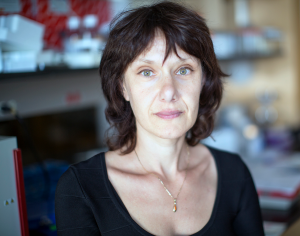 The Automatic Cell Imager and Plate Reader Cytation3 is housed at the Analytical bioNanotechnology Core (ANTEC) of the Simpson Querrey Institute (SQI). The Cytation3 combines cell imaging and conventional microplate detection, thus enabling an array of analytical technologies ranging from microscopy, automatic cell counting, sub-population analysis and image statistics to absorbance, luminescence, and fluorescence detection on slides, flasks, and plates. Accessorized with a linear and orbital shaker, two low magnification objectives (2.5x and 20x), multiple channels (DAPI, GFP, Texas Red), an incubator capable of temperatures up to 45C and a CO2 controller, the equipment is ideally suitable for maintaining conditions for time-lapse live cell imaging experiments. With its unique collection of capabilities, the Cytation3 is a user-friendly and one of the most popular instruments at ANTEC.
The Automatic Cell Imager and Plate Reader Cytation3 is housed at the Analytical bioNanotechnology Core (ANTEC) of the Simpson Querrey Institute (SQI). The Cytation3 combines cell imaging and conventional microplate detection, thus enabling an array of analytical technologies ranging from microscopy, automatic cell counting, sub-population analysis and image statistics to absorbance, luminescence, and fluorescence detection on slides, flasks, and plates. Accessorized with a linear and orbital shaker, two low magnification objectives (2.5x and 20x), multiple channels (DAPI, GFP, Texas Red), an incubator capable of temperatures up to 45C and a CO2 controller, the equipment is ideally suitable for maintaining conditions for time-lapse live cell imaging experiments. With its unique collection of capabilities, the Cytation3 is a user-friendly and one of the most popular instruments at ANTEC.
As with many instruments in the SHyNE facilities, the Cytation3 is popular among researchers from Northwestern and beyond. Currently, 61 individual users from 20 departments affiliated primarily with the Feinberg Medical School and SQI of Northwestern University utilize the Cytation3 in their research, and it contributes to 57 individual research projects. A few are listed below:
- In the study lead by Samuel I. Stupp and Dr. Job Boekhoven, researchers affiliated with SQI and Northwestern University’s Departments of Biomedical Engineering, Chemistry, Materials Science and Engineering, Medicine, Physics, and Astronomy conducted research suggesting that supramolecular systems, functions, and energy landscapes are linked, superseding the more traditional connection between molecular design and function. It was found, that supramolecular systems access different thermodynamic wells in their energy landscapes depending on their assembly pathway and as a result display differences in their interactions with cells in respect to cell adhesion and viability. In vitrocytotoxicity measurements, as well as fluorescent imaging and colorimetric measurements were performed on the Cytation 3.
- Prof Ramille Shah and Dr. Adam Jakus, along with other researchers published a ground breaking study describing a new biomaterial, Hyperelastic “bone,” which was designed, developed and tested in Prof. Shah’s lab. The “bone,” made from a naturally occurring mineral hydroxyapatite is flexible, non-immunogenic, highly porous and absorbent. It was found to support cell viability and proliferation, and induced osteogenic differentiation of bone marrow–derived human mesenchymal stem cells cultured in vitro over 4 weeks without any osteo-inducing factors in the medium.
- In her graduate studies in the field of regenerative medicine Alexandra Edelbrock, from the Stupp Lab, focused on creating biologically active conditions to stimulate neuronal differentiation after injury. Alexandra added stimulative bio materials which increased electrical activity of neurons over time, indicative of neuronal maturation and survival after spinal cord injury. The Cytation3 which allows top-down imaging is the only instrument Edelbrock can use to image micro-electrode array plates utilized to evaluate neuronal activity.
 Core Director Alexandra Kolot and Research Technologist Christopher Tarczynski are in charge of the day-to-day operations and management of the core, new user training, technical assistance and troubleshooting, as well as
Core Director Alexandra Kolot and Research Technologist Christopher Tarczynski are in charge of the day-to-day operations and management of the core, new user training, technical assistance and troubleshooting, as well as  coordinating technical seminars and training by industry research and development specialists. Alexandra Kolot has a background in neurobiology, with a Master’s degree from the Weizmann Institute of Science in Israel. She has been with SQI since it opened in 2005. When Alexandra is not working at SQI, she enjoys camping, hiking, and skiing. Chris has been working at SQI for over 4 years. He has a bachelor’s degree in Biology from the University of Illinois at Urbana Champaign. In his free time, Chris like to go hiking and scuba diving and enjoys traveling the world.
coordinating technical seminars and training by industry research and development specialists. Alexandra Kolot has a background in neurobiology, with a Master’s degree from the Weizmann Institute of Science in Israel. She has been with SQI since it opened in 2005. When Alexandra is not working at SQI, she enjoys camping, hiking, and skiing. Chris has been working at SQI for over 4 years. He has a bachelor’s degree in Biology from the University of Illinois at Urbana Champaign. In his free time, Chris like to go hiking and scuba diving and enjoys traveling the world.
If you are interested in using the Cytation3, please contact Ben Myers at shyne@northwestern.edu or (847) 467-1081